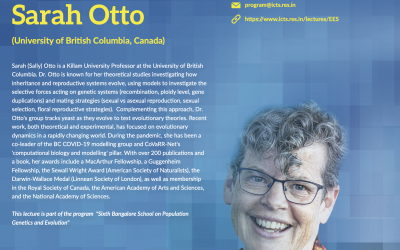Understanding the selective forces maintaining sexual reproduction has been a long-standing question in evolutionary biology. The near universality of sex, in the face of its many costs, has been touted as one of the biggest open questions in the field, earning such labels as “mystery,” “enigma,” and “paradox.” This talk will provide an overview of the diversity of reproductive modes across eukaryotes and theoretical advances in resolving the origin and maintenance of sex. Along the way, I will highlight the often hidden assumptions, gaps in our understanding, and promising recent directions.
About the speaker: Sarah (Sally) Otto is a Killam University Professor at the University of British Columbia. Dr. Otto is known for her theoretical studies investigating how inheritance and reproductive systems evolve, using models to investigate the selective forces acting on genetic systems (recombination, ploidy level, gene duplications) and mating strategies (sexual vs asexual reproduction, sexual selection, floral reproductive strategies). Complementing this approach, Dr. Otto's group tracks yeast as they evolve to test evolutionary theories. Recent work, both theoretical and experimental, has focused on evolutionary dynamics in a rapidly changing world. During the pandemic, she has been a co-leader of the BC COVID-19 modelling group and CoVaRR-Net's 'computational biology and modelling' pillar. With over 200 publications and a book, her awards include a MacArthur Fellowship, a Guggenheim Fellowship, the Sewall Wright Award (American Society of Naturalists), the Darwin-Wallace Medal (Linnean Society of London), as well as membership in the Royal Society of Canada, the American Academy of Arts and Sciences, and the National Academy of Sciences.
This lecture is part of the program "Sixth Bangalore School on Population Genetics and Evolution"


